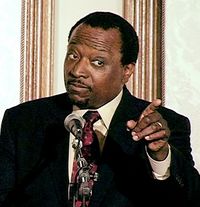Alan Keyes
Jump to navigation
Jump to search
Alan Keyes was a member of the Council for National Policy (CNP Membership Directory) in 1996, 1998, and 1999. Keyes, former U.S. representative to the United Nations, "was William Kristol's roommate at Harvard." [1]. NB: Though Keyes is sometimes referred to as "Ambassador Keyes," the title is misleading since he only served as the U.S. ambassador to the UN Economic and Social Council, not as ambassador to the UN or as an ambassador to a country.
Contents
Biographical information
- Born: New York
- Undergraduate Education: Cornell University/Harvard University
- Graduate Education: PhD in Government from Harvard University.
Political involvement
Electoral candidacies
- U.S. Senate (Republican) in Maryland 1988 LOST; Campaign Manager: William Kristol
- U.S. Senate (Republican) in Maryland 1992 LOST
- U.S. Senate (Republican) in Illinois 2004 LOST
- U.S. president (Republican) in 1996 and 2000
Political activities
- Keyes was part of Ronald Reagan's National Security Team in the capacity of unofficial advisor.
- Positions in the Reagan administration. In his words:
- "I was mostly in foreign policy. Well, altogether, I guess, in foreign policy, in those days. I was part of the Policy Planning Staff, during the early years of the administration, served at the United Nations as an Ambassador to the Economic and Social Council. Jeane Kirkpatrick was the perm rep and I sat on ECOSOC, and also represented the U.S. in the General Assembly Budget Committee and the Economic and Social Committees. I then went to be Assistant Secretary of State, overseeing our participation in the whole UN and international organizations system, and was also briefly part of the National Security Council staff. So I covered a number of areas in foreign policy and national security policy." [2]
- Keyes was president of Citizens Against Government Waste from 1989 to 1991
Influences
C-SPAN Interview (September 9, 1999):
- Q: Along the way, greatest influences among your teachers?
- Keyes: I think that, without any doubt, the greatest influence among my teachers was Allan Bloom, who was a professor at Cornell when I started there, went to the University of Toronto. I think ended his life and career at the University of Chicago, was well known as the author of a book called The Closing of the American Mind, which enjoyed some popularity a few years ago. Without doubt, Allan Bloom was, in terms of my academic and intellectual formation, the most important teacher I had.
- Q: Can you explain why?
- Keyes: I think because, in a way that ended up, really, capturing my both interest and serious thought, he understood the moral foundations of politics – at least the importance of those moral foundations. And instead of approaching a political life and the questions that we are involved with in politics and morality, as is often popular these days, as if it is all somehow a consequence of material relationships, he took seriously what had been the view of societies and eras before our own, which saw a self-subsistent basis for moral things, and therefore for political life, and which took that seriously, going all the way back to ancient times with Plato and Aristotle and others. And I just felt, and still deeply believe, that there is more truth in that than in those approaches that try to reduce human things to some kind of sum of the material forces that operate upon us as material beings.
Related SourceWatch resources
Sources
External links
- Alan Keyes' Skeleton Closet, RealChange.org. Includes links to primary source documents.
- Collection of his speeches, debates, quotes etc: RenewAmerica.org website.
- Republican Alan Keyes, ElectionSpeak.com, Presidential Election Campaign Videos.
